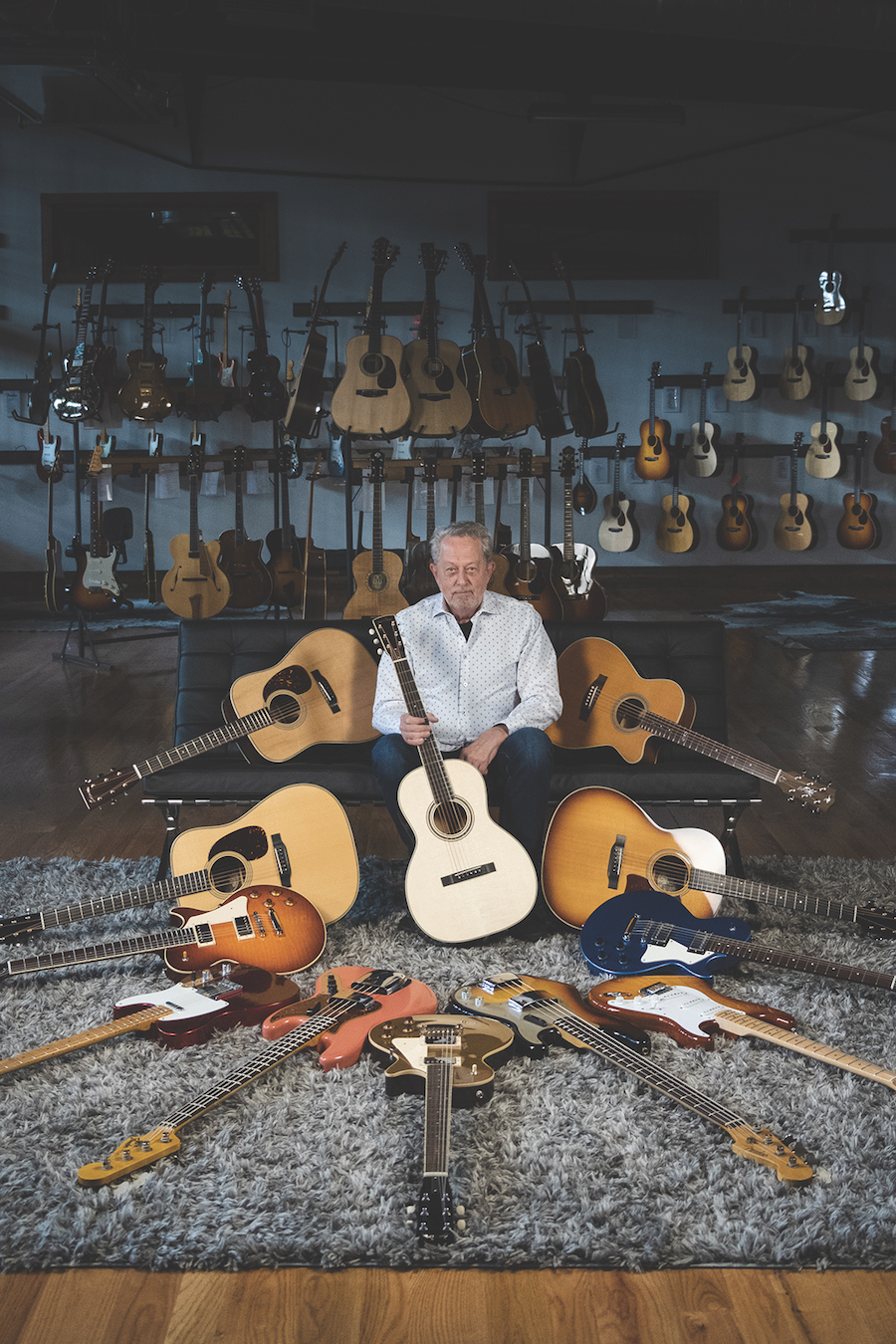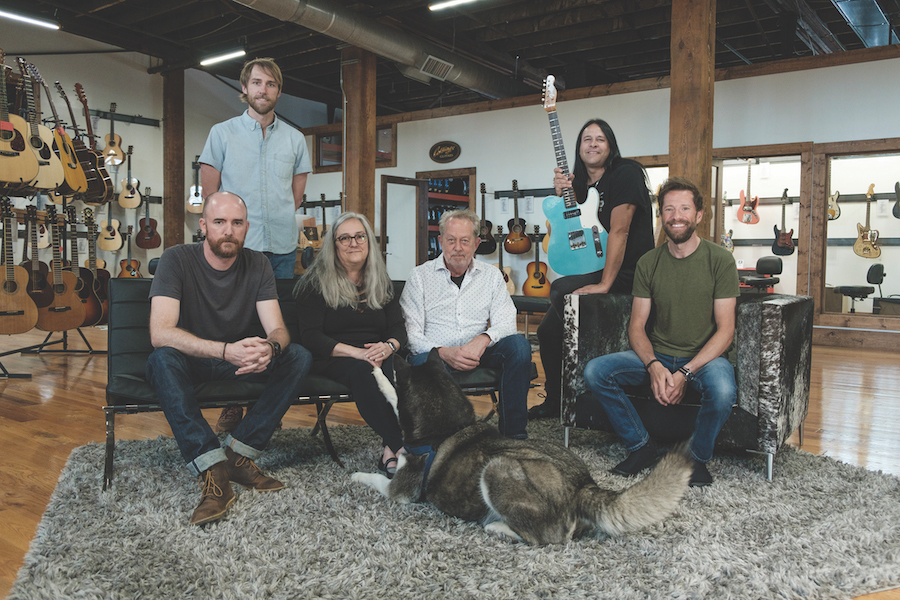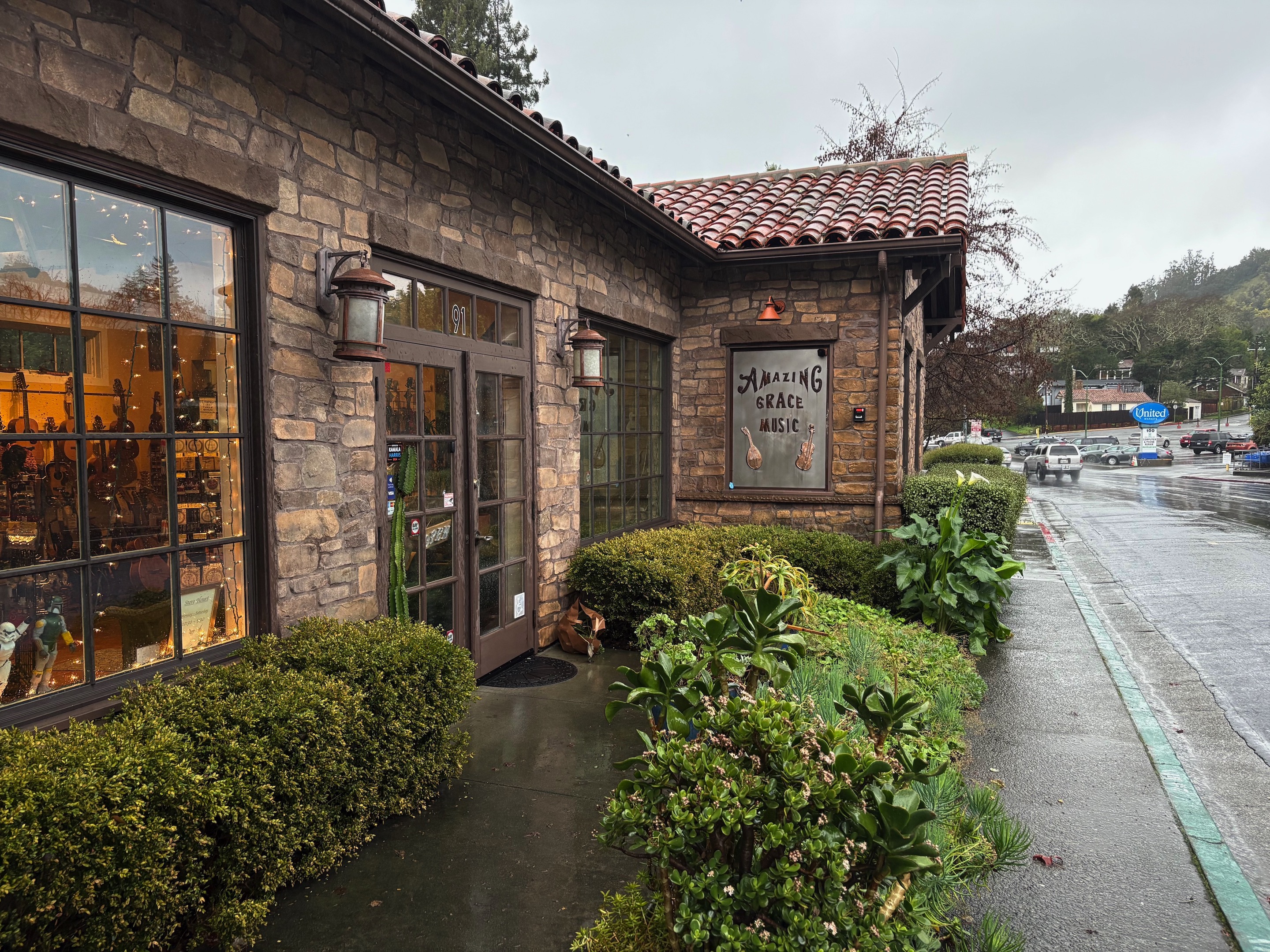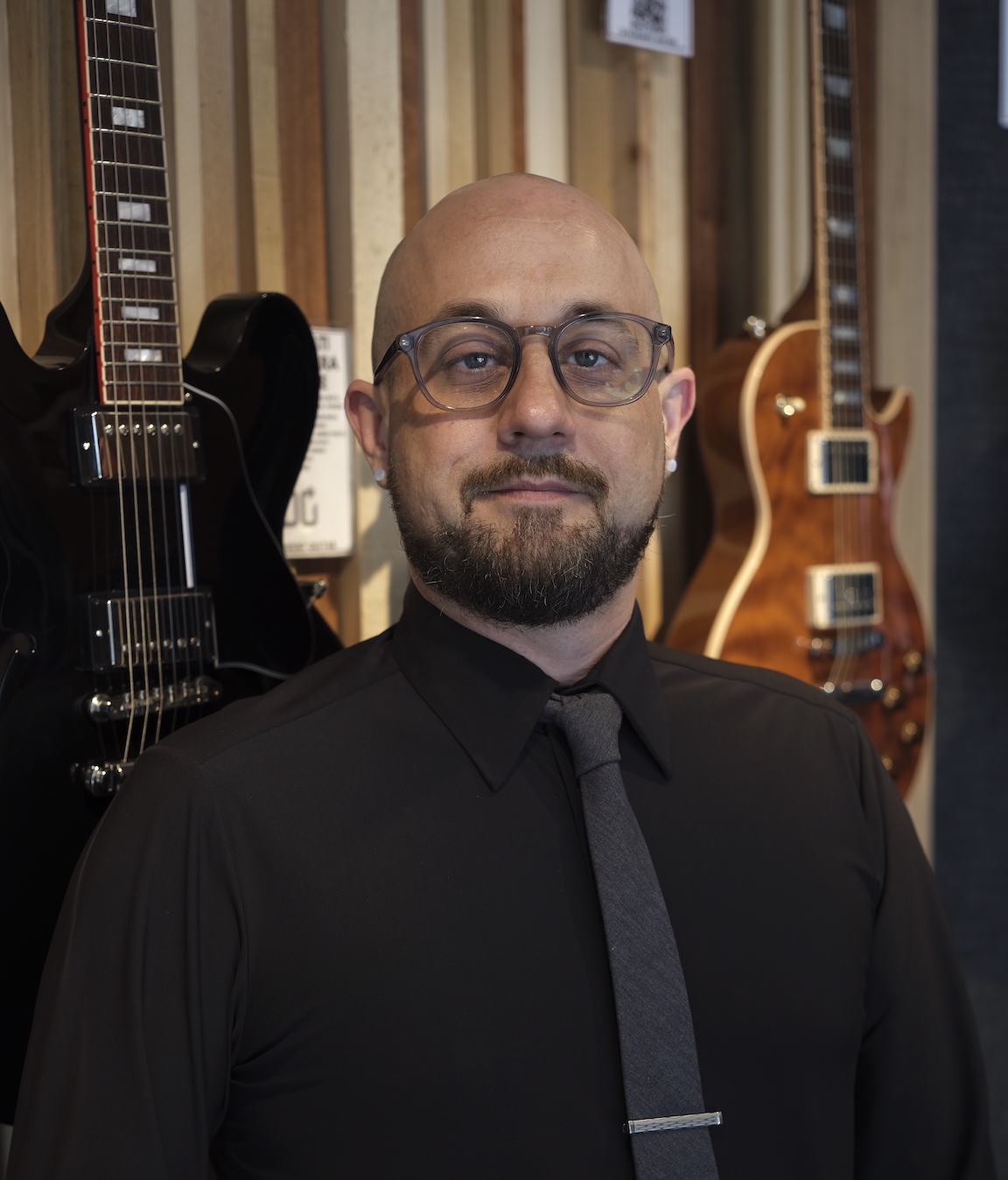
Bill Warmoth
When a guitar gets high-end enough, its purchase can become almost like buying a sports car. This comparison is what led Bill Warmoth, owner of Artisan Guitars in Nashville, Tennessee, into MI.
In his prior life, Warmoth spent 30 years in the automotive business, embarking on what he calls, “A long and arduous movement toward consumer-centric processes.” He was working at the retail level with luxury car brands like Jaguar, BMW, Ferrari, Land Rover, Rolls Royce and more, and noticed the experience of buying these types of cars was poor, when it shouldn’t be. He sought to fix this. “That was a difficult uphill battle for that industry,” he said.
Then, Warmoth bought a nice guitar, and noticed something. “In 2005, after a protracted, years long wait for a custom guitar, which is just happenstance, I recognized a niche parallel,” he said. “It was a bad buying experience.”
This blossomed into an idea — a guitar store specializing in “small, high value, core brands that were seriously underrepresented in the marketplace.” That idea has grown over time to where Artisan is selling Collings Guitars, Eastman Guitars, Fender Custom Shop, Huss & Dalton, Maton Guitars and Waterloo Guitars. Much of these are built-to-order for customers.

No Strollers, Please
Artisan got its start in Franklin, Tennessee, a town 20 miles south of Nashville characterized by beautiful, rolling hills of farmland; a certain quaintness; wealth and music. “It’s where a lot of professional A-list musicians live, and they would come by the store along with the local community,” Warmoth said.
But Artisan quickly began to grow beyond Franklin. “We launched a website simultaneously with launching the business,” he said. “Those two things grew hand in hand and with a lot of guerrilla marketing and support from our vendors. Obviously we built a client base [and] relationships all over the world. By 2010, Artisan Guitars was ranked number one in sales with a number of core brands.” This is why Warmoth feels any MI dealer should be on the internet. “You’d be a fool to dismiss it.”
In 2016, Artisan remodeled, cutting a hole between two spaces and doubling its size. At the time, Artisan was doing lessons — it had 115 students. But this didn’t align with what Artisan sells. “Music lessons, of course, bring entry-level players, and we didn’t have a product line that satisfied that need,” he said. So Artisan got rid of lessons.
But something else wasn’t quite right. Artisan’s new space was by all accounts very visually attractive, with a glass store front and guitars displayed floor to ceiling. This attracted customers Artisan didn’t want.
“We were inundated with foot traffic,” Warmoth said, describing his old location in a mall called The Factory at Franklin. “What was an old factory had become a mall atmosphere with two big rental halls, one at either end of the the facility, one that CMT used for road events several times a year and there were always events in both spaces, four or five days a week. And we had a record shop and four restaurants on the property. There’s a coffee shop right across the hallway from us.” This coffee shop attracted Brad Paisley, who became an Artisan customer, but that still didn’t mean The Factory was a fit for Artisan.
“There was quite a mix of general public that didn’t even play guitars that wanted to come in,” Warmoth said. “We even put a sign on the door, ‘No strollers, please,’ for instance, just as a little hint of what we were dealing with and people would march in the front door with strollers. It’s not the kind of place where you could just stop them and explain that these guitars that are all exposed at all different levels, they’re not locked up, some of them are quite expensive — $20,000 is not uncommon.”
Jesse Tucker, a sales representative at Artisan, puts it another way. “We had everybody and their grandmother with an ice cream cone and a dog coming in to look at things,” Tucker said.
Warmoth admits, “We had created the problem” by making the public-facing store front so attractive. But he said it was difficult to explain to anyone that high foot traffic was a bad thing. His business model needed to change.
Make an Appointment
Artisan made the decision to go appointment-only. This decision came when Warmoth saw that he had as much, or more, web-based sales as he did in the store. “We had entertained the general public happily and spent a lot of time with them, sharing our stories about the brands and about the builders, but that was not our core customer. So at the end of the day, a crew of six or seven, eight guys would be doing a lot of handholding.” He recognized this was a waste of time and resources.
Warmoth noticed his core customer coming at him in a particular place — his email inbox. “At six o’clock, turn the lights off and of course the employees are ready to go home, and my wife and I would sit there and look at the computer saying, “Jeez, look, we got another 25 emails,’” he said. “So doing emails early in the morning before work and emails late at night, staying late, became commonplace.”
All of this could have been done during work hours, when Artisan was fending off the general public. These emails were coming from people interested in high-end brands, curious about specific things like selections of woods and levels of consistency in manufacturing. Warmoth saw these email threads twist on for months but eventually lead to sales.
He also realized he was offering something here that others were not. He had customers tell him, “I sent that email maybe to four other dealers, and you’re the only one that’s written me back.”
Having gone appointment-only, in November 2019 Warmoth made the decision to move Artisan into the heart of Nashville, so closer to his core customers. It’s now in the Track One office space complex, a location more tucked out of the way.
“The decision to move into the building we’re in [was made because it’s] an old building that was already locked down from the general public and not easy to find your way to get in,” he said. “You need a four-digit code on a keypad to get in. [That was] more ideally suited to where our employees could schedule appointments, spend an hour, two hours with a guest who knew exactly what they wanted to do, [have them] come in and try some guitars and give them that one-on-one quality time without being interrupted, frankly, or distracted by the general public coming and going.” The new location is 4,000 square feet, with seven employees on staff.
Tucker feels the focus that comes from setting appointments is Artisan’s competitive advantage. “What sets us apart is the time spent individually with players, people looking for not necessarily just run-of-the-mill things,” Tucker said.
“If we have an old guitar, pre-owned, we’ll spend as much time on that with the player as we will walk you through all the pieces of a custom guitar order. It’s the time that we devote to that process as opposed to trying to get as many people through our phone system or through, in the old days, the door, as possible. We don’t want to be listening to four different people play four different versions of ‘Dust in the Wind’ all at the same time.”
Tucker is a guitarist, and uses his background as a musician in serving customers. If the customer doesn’t align with his experience, he projects them onto himself. “If I don’t have anything in common with the person that I’m working with in terms of their level of experience with instruments or the type of music it’s going to be used for or their outlook or goal for that instrument, then I have to put myself into their mindset and still think of, ‘OK, well, what would be important to me if I’m looking at it from their perspective?’ I look at it like if I got a call to go do a gig, if I grabbed this guitar, this is the one they put in my hands, would I be able to put it to work immediately? And I work from there.”
Tucker explained that putting himself in the musician’s shoes allows them to avoid pitfalls in ordering a customized guitar. “Joe Nashville or whoever he is ordering a guitar, he’s going to own it,” he said. “But I put it together as if it were going to be something that I would own myself. And I put that level of thought into it because otherwise it would be not helping them in any way. I’d just be giving them what they might think they want, and that doesn’t help anybody.”
Tucker explained it’s different when working with collectors, who might just be looking to have one of everything. “The folks that rock them on the weekend on the couch, that’s a different mentality, and I’ve got to put myself into their headspace,” he said.
He is happy Artisan moved from Franklin to Nashville. He relayed a story in which a friend of the store staying at a hotel downtown got on a Bird scooter — which Tucker described as “a motorized deathtrap with two small wheels” — and rode it from his hotel to Artisan holding a guitar he wanted to sell on consignment; a comical mental image. “I thought ‘Yeah, wouldn’t have been able to do that in Franklin because 15 miles on the highway on a scooter that only has a range of eight miles ain’t gonna cut it.’”
The Convenience of Content
Artisan has served some famous musicians over the years. There was the aforementioned Brad Paisley, but also Peter Frampton, Garth Brooks, Sturgill Simpson, Eric Church, Jim Lauderdale, Lee Brice and Josh Osbourne.
A key tool for Warmoth in establishing such a rich customer base has been social media. “Our market is pretty much worldwide and the best way to reach those people is through social media,” he said.
Artisan actively posts on Facebook and Instagram, and does Google advertising as well. But he said the high-end nature of his product makes directly tying ads to sales difficult to impossible. “[In the] web shopping industry, people talk about conversion rate and that’s where they can plant a pixel on your website, and they can say, ‘Well, that ad or that post or whatever directly related to that purchase,’” he said. “They follow it all the way through to the shopping cart. Conversions cannot be measured accurately with our business because it’s a high-ticket item. You made a post on Tuesday about a specific guitar and over the course of that week, you’ve got three or four people interested in that guitar.” But these queries are phone calls or emails. The final purchase is separated from the effect of the ad, at least in the realm of formal data tracking.
Like many business owners, Warmoth has come to realize the power of content, and channels that on Artisan’s blog, writing deep dives on frequently asked questions. Artisan might field a question like, “Why are those sunbursts different? I’ve looked at multiple dealers’ websites and those sunbursts look inconsistent.” According to Warmoth, the answer is, “Well, everybody’s using different cameras, different lighting, and that’s an education to the customer.”
So Artisan writes blog entries in response to such questions. “We’ve got one about string tension and how to use the string tension calculator for open tunings for the guy [who] wants to do dropped tuning and he doesn’t know why the strings get sloppy,” he said.
Warmoth said this speeds up answering customers’ questions online. “It serves our interests,” he said. “We can do a shorter explanation in an email and give them a link to that article and say, ‘Read this article and you’ll understand more of what we’re talking about.’”
A Dire Situation
Like anyone in MI over the last year, Warmoth and Artisan felt the effect of the pandemic. “It was nothing we were in control of. You couldn’t advertise your way out of that,” he said. “It certainly negatively impacted the first half of last year so badly that, as a business owner, we felt like it was a dire situation. We had just moved to a new facility and spent gobs of money building this space out and then a pandemic hits about four months after we moved in. And so we had a lot of uncertainty just like our customers did, especially selling big-ticket items.”
Like many dealers, Artisan then saw sales start to rise, but with that came stocking challenges, as demand grew at a rate outpacing supply. “The second half of the year was a surprise, and then we found ourselves where we are today, where all the builders have gone through supply issues and social distancing in their workshops,” he said. “Production’s become delayed so much so that build slots on all of our built-to-order brands are stretched out into the end of ‘22. Our inventory has shrunk to half or less of what it was a year and a half ago. And while that’s a little uncomfortable, guitars are selling quick, more quickly than they ever were.”
Warmoth is smart enough to doubt that this sales surge is permanent, but does think that the push toward online sales is here to say. “The core customer in our older age group, which really is the buyer for more high-end instruments you could say in broad terms, I think they’re more comfortable buying over the internet as a result of the pandemic.”
Artisan also, of course, evolved its processes in terms of instrument sterilization, with some help from one of its suppliers. “We learned a lot from our friends at Collings early on about how to properly sanitize an instrument without damaging it,” he said. “To their credit, they experimented with a lot of household products and then explained and shared what they found, what they learned. After every guitar is handled in our shop, it gets marked for sanitization and our guitar tech goes around the room and does that before the guitar goes back on display.”
All of Artisan’s staff is vaccinated, but it still exercises caution in interacting with customers. “Just recently, at the beginning of May, we agreed as a group that it was OK for all of us to have our masks off within the group when we’re in the store without guests. When guests come in they need to be masked and we mask up. Tennessee has been a real laggard in getting vaccinations.”
Knocks Their Socks Off
Having sorted out exactly what Artisan does best so well, Warmoth is optimistic about the future. “I’m pretty confident that we’ve got at least three to five years of steady growth ahead of us,” he said.
Asked what he likes most about working with the brands he champions, Warmoth returns to his time in the automotive industry. “It’s like the high-line car industry — it ain’t for everybody,” he said. “We get to design our guitars, if you think about it. And that’s really not only an important part of our jobs, but it’s something that we enjoy doing as there’s a lot of personal gratification in that. Nine months to a year later the guitar arrives and we ship it off to the buyer, the prospective owner that ordered it, and, if we did our jobs right, it knocks their socks off.” MI












